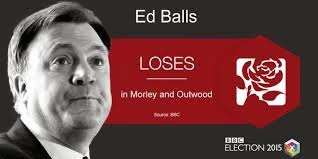 |
| What? What? The Tories on 316 seats? I couldn't believe the scale of the victory |
Incidentally, I don’t believe the polls were wrong. What seems to happen is that a small but crucial number of people tell pollsters that they plan to vote Labour. They may not even be lying. That may be their intention when they say it. But then they go into the polling station and vote Tory.
In my mind, these so-called “shy Tories” are people who feel they really ought to vote Labour, perhaps because they know it represents their interests. So that’s what they tell the polling organisations.
But the Labour leaders are not unlike the Tories: educated at similar schools and universities, less wealthy perhaps but still far wealthier than anyone on the median wage or less. In the loneliness of the polling booth they think about these two sets of people, both representatives of what they may perceive as a kind of master class. If they are to choose one such person, why not make it the one born and bred to be a master – in other words, a Tory?
The final batch of polls had the following standings for the main parties on the eve of the election:
- Lord Ashcroft: Conservative 33%, Labour 33%
- Ipsos MORI: Conservative 36%, Labour 35%
- Populus: Conservative 33%, Labour 33%
- ICM: Conservative 34%, Labour 35%
All tight. And all of them adding up to a total, for the two main parties, of 66-71%.
The actual result was Conservative 38%, Labour 31%. A total of 69%, but a substantial lead to the Tories. All it takes, however, to get there from what the polls were showing is a switch by about 3-4% of the electorate. That’s probably about the extent of the “shy Tories” out there, and they determined the outcome last night.
It’s against that background that I set my British Spaghetti Western, The Good, the Sly, the Inept.
First, the good. That has to be the Scottish National Party, the SNP, and its leader Nicola Sturgeon who had an excellent campaign – rewarded by a near clean sweep of Scotland. There was a time that we in the Labour Party would laugh at the Tories for having only one Scottish seat. Now the laugh’s against us: as well as the Tories, we too, as well as the Liberal Democrats, only have a single Scottish seat.
The other 56 have been won by the SNP. It has even managed to win the election of the youngest MP for 350 years, Mhairi Black, a twenty-year old student who has to fit in finishing her degree in the next few weeks, around taking up her newly-won position at Westminster. She unseated Labour’s Foreign Affairs spokesman, Douglas Alexander, in Paisley and Renfrewshire South.
Next, the Sly. This is the only prediction I got remotely right. The Tories are like the Sandman: get too close and you’re likely to fall asleep. Back in 2010, when they didn’t have enough seats to form a government, they approached the Liberal Democrats who then had 57 seats, to join them in coalition. The Lib Dems said yes, much to the amazement of many of us who had regarded them as a party of the centre-left, much more naturally allied to Labour than to the Conservatives.
We predicted that the electorate would take a terrible vengeance on them, reducing their numbers to a level from which it would be impossible to recoer for a generation. Even so, again guided by polls, most of us felt that they might hang on to 20-30 seats. In fact, they now have just eight. Some of the party’s biggest hitters have gone, including David Laws, one of the main architects of the coalition. The leader Nick Clegg clung on, but he’s leader no more, having resigned this morning.
And finally, the Inept. My own party. Our arcane constitution allowed the Trade Unions to foist on us a leader, Ed Miliband, who is I’m sure immensely likeable, principled, honest, decent and lots of other great things. But a no leader. He appointed as his Finance spokesman Ed Balls, and together they crafted a message to the effect that they, like the Tories, would impose a policy of austerity, but they’d do it more nicely.
Nicola Sturgeon of the SNP pointed out that this stance presented the British electorate with the choice between Tory austerity, and Labour austerity-lite. Not exactly inspiring.
Working to get out the vote around Luton, I had someone tell me that she had voted Labour, but against her instincts – she felt little confidence in the party. One even said that she might not vote at all, because Labour hadn’t cleansed itself of the Blairite tendency that took us into war in Iraq.
As Alex Salmond, Nicola Sturgeon’s predecessor as leader of the SNP, last night told TV presenter Jeremy Paxman in a master class on how to handle aggressive questioning, if Ed Miliband had “fought the sort of campaign that Nicola Sturgeon fought in Scotland, then he’d be in a much better position this morning.” Indeed. Though he might also have had to learn to handle the media the way Salmond and Sturgeon do.
Well, that’s all in the past now. Ed Miliband has also stepped down. And Ed Balls was defeated for re-election in his parliamentary seat.
 |
| Crafted the economic policy that contributed to Labour defeat And paid by being beaten himself |
Italian spaghetti Westerns leave you feeling entertained. This British one, on the other hand, leaves you with a bitter taste in your mouth. I suppose it’s like the contrast in weather between the two countries.
No comments:
Post a Comment